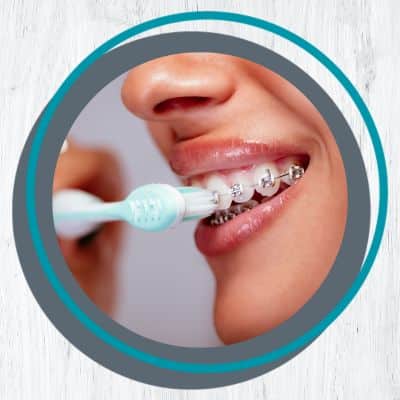Keeping your teeth and gums clean and healthy is important to every person at every age. People wearing braces or clear aligners are no exception. In fact, if you are receiving orthodontic treatment, you should prioritize taking care of your teeth and gums because it will help the entire process go smoothly. We share the importance of excellent oral hygiene during orthodontic treatment.
Extra Pressure

Braces move teeth by putting pressure on them. Your teeth and gums need to be strong to withstand the extra pressure. Healthy gum tissue is tough and flexible. If gums are swollen or weakened by gum disease, they are not suitable for orthodontic treatment. Similarly, if your teeth are fragile, brittle or extra-sensitive, they may not be ready for the type of pressure needed to move your teeth over time.
How Teeth Move
Teeth naturally move over time. They don’t move when you press your tongue against them, but they do shift slowly. Gum tissue, called the periodontal ligament, together with a layer of cementum, holds teeth in the jawbone. When steady pressure is applied to teeth, the bone on one side dissolves and grows again on the other side. You can’t see bone dissolve and grow because it happens slowly over time. This is why orthodontic treatment can take around two years to move teeth into the correct alignment.
Good Oral Health = Successful Tooth Movement
The slow, steady process of applying pressure to teeth and allowing the bone to dissolve and solidify again is dependent on good oral health. If there are major problems in your mouth, such as gum disease or serious tooth decay, those problems need to be addressed first. Applying extra pressure under those types of oral health conditions could cause further damage. Teeth won’t move correctly, either, if the gums are not healthy.
Keep Your Mouth Healthy When You Have Braces
When you have braces or clear aligners in your mouth, you need to spend a little more time taking care of your teeth and gums. Follow these tips to ensure a healthy, straight smile.
- Brush frequently. Food particles can get trapped in the wires and bands on your braces. This means your teeth could stain, or you could end up with more plaque and cavities. Brush frequently, especially after meals, to ensure you get all the food out from under the wires.
- Keep flossing. Flossing is more difficult with braces but not impossible. Be persistent with your good flossing habits because it really does help to keep your teeth and gums healthy. Ask a member of the Virginia Orthodontic Partners team for tips on how to floss with braces.
- Rinse with mouthwash. Swishing mouthwash through your mouth can help wash out tiny particles that your toothbrush or floss couldn’t reach. Your mouthwash should include fluoride as an ingredient. Stay away from any mouthwash that has alcohol as an ingredient.
- Get regular professional cleanings and exams. Just because you are seeing your orthodontist more often doesn’t mean you can skip out on your regular dentist appointments! Getting a professional exam and cleaning is key to keeping your teeth healthy. Your dentist can spot problem areas or detect gum issues before they become serious. With effective treatment and preventative care, your teeth can remain healthy throughout your orthodontic treatment time.
- Avoid eating certain foods that could damage braces. Damaged braces are not good for your teeth or your overall oral health. Remember not to eat foods that are sticky, chewy or crunchy. Sticky candy can be especially detrimental to your braces. Popcorn can easily get caught in your wires, and biting into a whole apple might break a bracket.
If you have any concerns about your oral health during your orthodontic treatment, make sure you tell your orthodontist or dentist. Our team is always happy to answer any questions you may have and are available to help you practice proper brushing and flossing techniques if necessary. Contact Virginia Orthodontic Partners today for your appointment!




